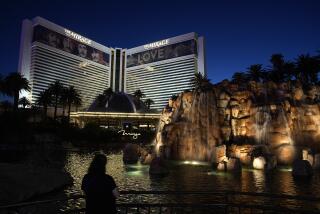Heavyweight Showdown
- Share via
Boxing matches are a staple of the Las Vegas scene. Now two heavyweight casino companies are set to square off for dominance of the U.S. gambling industry.
In one corner is Harrah’s Entertainment Inc., which confirmed Thursday that it had agreed to pay $5.2 billion for Caesars Entertainment Inc. in a buyout that would create the world’s largest gambling enterprise. The deal would consist of $1.8 billion in cash and $3.4 billion in stock, plus the assumption of $4.2 billion in debt.
In the other corner is Los Angeles billionaire Kirk Kerkorian’s MGM Mirage, which just a month ago agreed to buy Mandalay Resort Group for $4.8 billion, including the assumption of $3.1 billion in debt.
But instead of coming out swinging, both companies have taken the first punch -- from Wall Street.
Shares of Caesars fell Thursday by 95 cents, or 6%, to $15.05 on the New York Stock Exchange. And Harrah’s shares dropped $3.07, or 6%, to $47.91, also on the NYSE.
Terms of the transaction value Caesars’ common stock at $16.96 a share, a 22% premium over the $13.92 closing price of the shares Tuesday, before initial reports of the buyout talks.
Because of the large amount of stock that would be exchanged between the two companies, the price of Caesars shares is now tied to the fortunes of Harrah’s. In fact, each time Harrah’s stock falls by a dollar, Caesars will drop by 20 cents, estimated William Lerner, a Prudential Equity Group analyst in a note to investors. Conversely, if Harrah’s shares rise, so will Caesars.
Lerner downgraded Harrah’s stock because the deal would make it the dominant player in Atlantic City, N.J., which is vulnerable to gambling industry expansion in nearby states.
MGM Mirage faces similar hazards. Its acquisition, like Harrah’s, requires the approval of federal and state antitrust regulators, and investors are concerned that MGM might have to sell one or more of its key properties on the Las Vegas Strip, where it would have a nearly 50% market share if its transaction moves forward unhindered.
Its shares have fallen about 8% since June 4, when it disclosed the Mandalay talks. MGM dropped 74 cents Thursday to $42.44 on the NYSE.
“Harrah’s is going to create some difficulty for the MGM deal. The government is going to pay even more attention now,” said Steven Newborn, a Washington attorney and former head of merger enforcement for the Federal Trade Commission.
Analysts said antitrust concerns and other issues could delay the closing of the deals well into next year.
If the transactions close as planned, “the two [companies] will monopolize just about the entire gamut of Las Vegas patrons,” said Patricia Wright, an industry analyst with Fitch Ratings in New York.
Yet each would employ a different strategy to tackle the gambling business, noted Michael Scerbo, an analyst with Standard & Poor’s Ratings Services in New York.
Harrah’s is looking for geographic diversity and avid gamblers -- the type who like to play lots of slot games and can be coaxed by complimentary meals, rooms and other rewards to gravitate to other Harrah’s casinos around the country, he said.
Based on a review of regulatory filings by the concerns, the combined Harrah’s-Caesars would expect to derive about 70% of its projected revenue of more than $8 billion from gambling. It would come on volume: lots of people making lots of small bets, mostly at the slots.
The company wouldn’t be looking for the super-rich gamblers ready to drop $1 million apiece over the course of a weekend at one of its properties. Harrah’s Chief Executive Gary Loveman said Thursday that he might scale back the high-stakes table gaming business that has been a hallmark of Caesars Palace.
Only about 10% of Harrah’s-Caesars revenue would come from hotel room charges, and even less from entertainment and other services. Based on 2003 financial data, Harrah’s and Caesars gave away about $1 billion in rooms, meals and other goodies to coax gamblers into their casinos.
The MGM-Mandalay venture, by comparison, would be all about Vegas, posh hotels and high-stakes gamblers, especially table gamblers, Scerbo said.
It would control nearly half the business on the Strip and operate the Bellagio, MGM Grand, Mandalay Bay Resort, Excalibur and seven other hotels there. Still, it would be the smaller of the two companies, collecting about $6.4 billion in revenue.
Gambling would account for only about half of MGM’s business, reflecting the resort nature of its properties.
For now, there’s one area where MGM Mirage is clearly beating Harrah’s to the punch: Oscar De La Hoya will fight Bernard Hopkins for the middleweight championship at the MGM Grand in Las Vegas on Sept. 18. Caesars Palace, once the prizefight king, has no major boxing matches scheduled for the rest of this year.
More to Read
Go beyond the scoreboard
Get the latest on L.A.'s teams in the daily Sports Report newsletter.
You may occasionally receive promotional content from the Los Angeles Times.











